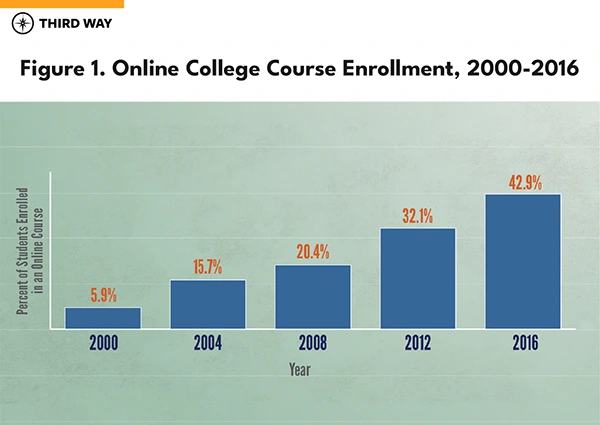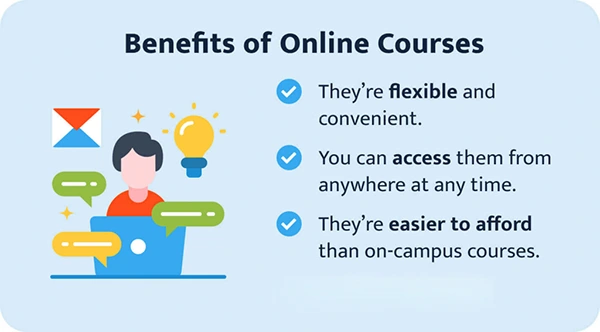
Online degrees have gained prominence since COVID-19. Now all students have a choice: do they want to learn in person, online, or through some combination of both options?
Some learner may appreciate the flexibility of digital courses but need to be more confident about the credibility of their future studies. Will employers take less kindly to the pupils who graduate from an e-learning school? Will their qualifications even be recognized in the state where they live?
In this article, we comprehensively examine answering all of these questions. Read on to learn more about how online education enhances your higher education.
Are Online Degrees Legit?
That’s the first and perhaps most concerning consideration that most future college students face. Will your digital training be worth the money you pay for it?
The answer is yes, provided you do your research before signing up. Any degree from a fully accredited university will help you find employment. It does not matter if you took all online classes at a traditional university. It doesn’t even matter if the school you went to doesn’t have a physical campus. If the program is fully recognized, your degree will be valid.
When it comes to e-learning curricula at traditional universities, there is no distinction at all. No one will know if the classes you took were online or in person.
Future employers may recognize that you participated in remote education if the school where you graduated from is fully digital but chances are they won’t much care. Keep in mind that they probably handle important meetings and projects in virtual spaces as well.

Bottom line? In terms of credibility, there is no need to worry about the opportunities your degree will bring.
Really?
Well… This is the Internet we’re talking about. There are scams. Some systems are recognized in some states but not others. This is a particularly relevant concern if you are looking for a specialized certification.
For example, let’s say that you are trying to become an Illinois nurse through an accelerated program. There might be dozens of e-learning programs that allow you to achieve certification in the country. Illinois may only recognize three or four of them.
It’s important to research not just the program’s credentials, but also what your state or other governing body says on the matter.
You can further research an online school by looking into student outcomes. How good is this university at helping with job placement? What do people have to say about the teachers? Naturally, the Internet is a great resource for finding answers to all of these questions.
Online Education is an Asset

For those who learn well online, getting a remote degree has many benefits. These include:
- Affordability: Granted, this is only sometimes the case. If, for example, you participate in an e-learning course at an Ivy League school, you are more or less going to pay Ivy League rates.
However, if you choose a fully remote course, you will almost certainly find that the price you pay per credit hour is less than you would pay in a traditional classroom environment.
The extent to which you save money is based on the program itself. Some online schools can be as much as 50% more affordable than their traditional counterparts.
- Flexible: Online programs are also known for being more flexible than traditional learning environments. Many e-learning curriculums are pre-recorded. This means that the professor records lectures and assigns work and then allows the students to complete it in a timeline that is convenient for them.
Naturally, there are limitations to the program’s flexibility. Candidates are still expected to meet deadlines. However, they do not necessarily need to meet at specific times throughout the week. This is a great way for people who are busy with family or professional life to still get a degree.
- Adaptable: Because there are so many different options for online schooling students can choose programs that utilize a format they are comfortable with.
If you want live lectures, you can certainly find e-learning schools that have them. If you want self-guided work, some options provide that as well. This sky is pretty much the limit.
Another less-discussed benefit of distance studying is that you are not geographically limited in your options. Let’s say you are 30 years old. You want to get a new degree and expand your career options.
The problem is that you have a spouse. You have two children. You even have a dog. You’re not going to relocate. Historically, that would mean that you were limited to schools that you could drive to.
But if you are willing to pursue a remote degree, your options, expand enormously. Now you can start looking at programs that specialize in what you want to learn.
You can even read up on expert professors and choose a topic based on who you want to learn from. Not everyone thinks about online learning in this capacity but it is a potential benefit that you can take advantage of with a little bit of extra research.
Are there Downsides to Online Learning?

Of course, there are! One of the biggest downsides is that some people simply don’t learn well in this format. Even strict online curricula are fairly self-guided. You have to decide to log on to your video lecture instead of turning on Netflix. That takes discipline.
If you are easily prone to distraction e-learning may not be a good fit for you.
It’s also worth pointing out that you won’t benefit from traditional college resources. No school library. No fancy labs. No opportunity to experiment with internet-supported physical devices like nurses in traditional environments have the opportunity to do. Limited capacity to exchange lesson plans with future teachers, the way you might in a brick-and-mortar education program.
It’s the lack of infrastructure that saves you money. However, it does provide a different experience. Is that experience worth six figures in student loans? Only you can decide.
Online learning is an excellent opportunity for some people. At the end of the day, however, only you can decide which learning format is best for you.